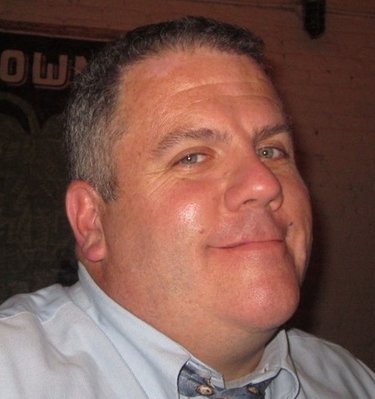Timothy Burke, Guilderland School Board candidate
GUILDERLAND — Timothy Burke, who has regularly attended school board meetings since 2003 and served for five years on the district’s now-defunct Citizens’ Budget Advisory Committee, is making his first run for the board because he believes there is a lack of leadership.
“In all the cutting we’ve done, I’ve never heard someone say, at this level, we’ll go past the cap,” said Burke. “There’s a lack of leadership on the board and a lack of long-term planning.”
Burke said the process, in recent years, has been: “Get rid of the least controversial items and hope we survive till next year.”
Burke said of the current school board members, “I don’t think they are giving us an idea of a program that can’t be cut. Where is the line in the sand?”
If he is elected to the board, Burke has several goals. He’d like to see the six-hour elementary-school day lengthened to seven, and he’d like to see full-time teaching assistants returned to kindergarten classes.
Burke believes that the New York State School Boards Association has failed to put adequate pressure on the governor and legislature to get mandates funded, as the governor had promised.
Burke, 45, is a manager with Living Resources, a not-for-profit that helps developmentally disabled adults with housing and programs. He is a National Guard veteran and has worked with the mentally ill in government programs; worked with youth in a program offering an alternative to incarceration — “I did 5,000 miles on a wagon train,” he said — and worked with sex offenders and drug addicts in a state secure facility.
He is married to Rae Ellen Burke, the director of labor relations for the state comptroller. They have a son, Tommy, 6, who is a first-grader at a parochial school.
“My primary goal is to serve the students,” Burke said, “to ensure they receive an adequate education.”
Burke does not support the $93.7 million budget proposal for next year. “Each year, they talk about the open budget process,” Burke said of school leaders. Since CBAC, where citizen volunteers spent weeks going through a budget draft as thick as a city telephone book during televised sessions, was disbanded, Burke said, “I don’t know what’s in the budget. All I see is what they are going to cut.”
In recent years, at community forums, participants have been given lists of potential cuts to comment on.
“The number-one issue is common sense,” said Burke, giving this example: “We spend about $64,000 a year sending kids to Tech Valley High School.” The district is reimbursed about half of that the following year, since the regional high school is a Board of Cooperative Educational Services program.
Burke said it does not make sense to spend $32,000 for four students when other programs that affect more students are cut.
On the fund balance, Burke said, “The governor has used that as a hammer on schools like ours.” Burke said wealthier districts are being rewarded for having larger fund balances. “The board hasn’t adequately let people know we follow the rules and are hurt by being given a label,” he said.
If the budget were to be defeated at the polls, Burke said he thinks it should be revised and put up for anther vote.
He also said, “Because of voter apathy in Guilderland right now, we don’t have to worry about it going down...Through the years, we’ve had few checks on spending in the district because of the poor voter turnout.”
On whether the board should ever consider going over the state-set levy limit, Burke said, “There are years it is appropriate to look at that.” That is a decision, he said, that has to be made “year by year.” Burke added that it is unlikely he would support it.
He went on to say that, even with cutting 227 positions since 2008, the district “still provided a good education,” but maybe “not what many board members [recall being] provided for their children.”
Burke asked this question: “How over-staffed were we before this budget crisis?”
He went on, “I said for years we were exceeding the staff we needed. Where was that point?” he asked. “I’d like acknowledgement we were overstaffed.” The district should figure out “what were the effective numbers,” he said.
On state testing, Burke said, “I think Common Core is well intentioned. As a parent, if I think it’s an issue for my child,” he said of the state tests, “I wouldn’t hesitate to pull him out.”
But, Burke also said there was “a frenzy now,” with parents removing their children from tests.
He also said there were problems with the implementation of the Common Core standards and he criticized the New York State United Teachers for “going back on their original agreement.”
He noted that Rochester, for example, graduates fewer than half of its students and said, “For NYSUT to say all is well strains credibility.” With places where students are “failing in a dramatic way,” the state system is “trying to catch students in dire circumstances,” Burke said. He conceded that might be “hard for a parent in Guilderland trying to get a kid into Columbia” to understand.
Burke concluded, “To argue these other children should be left behind is not morally responsible.”
He also said that some parents are not doing a good job of quelling anxiety over tests and, “If a student is capable of sitting for a test,” he or she should.
“Testing is not a problem as long as we’re not over testing,” said Burke. “There has to be a matrix...so teachers can guide a child along.”
Further, Burke said, “NYSUT doesn’t support a measure for teacher competency.” There are a few teachers, he said, who “fail to measure up...I want them removed. I don’t know how to do that without some kind of testing.”
On the consultant the district hired to look at the problem of excess space, Burke said, “The board showed real cowardice in not accepting the consultant’s report they paid for...They didn’t have to follow the recommendations.” Burke said, again, that the board lacked leadership and “pandered” to the crowd. They could have told the crowd, “We paid money for the report.”
Further, Burke said, “I would not take closing any of the schools off the table. It’s clear the district overbuilt with the extra house in the middle school...We could save quite a bit of money.”
If the board faces tough years for budgets again, he said of closing a school, “That’s something we may consider.”
On giving raises, he said, “At this point, when we’re asking students to make sacrifices, and we’re paying so much for retirement and health care, it’s fair to ask teachers...to go a year or two with zero percent.”
He also said, “They’re getting increases every year with retirement and health care.”


